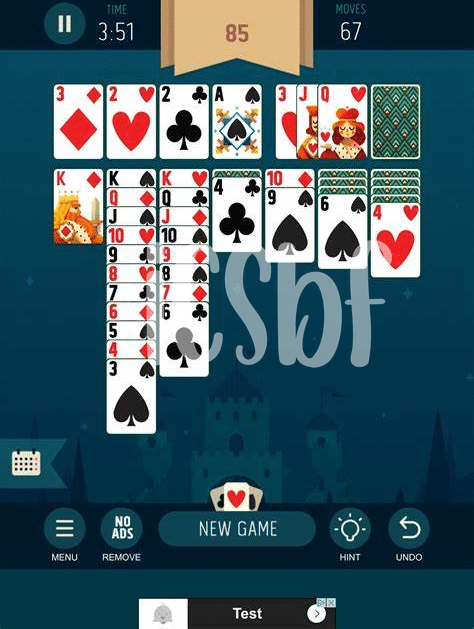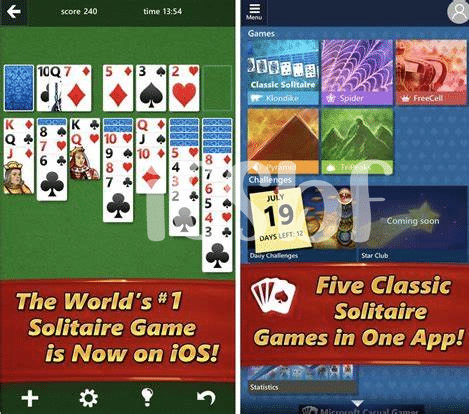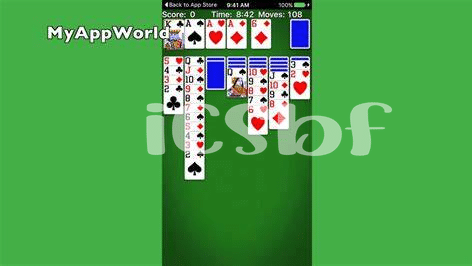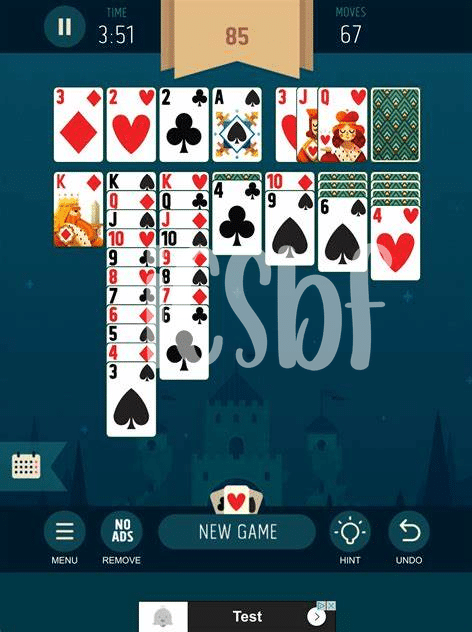The Humble Beginnings of Solitaire on Pc
Back in the day, before we rocked smartphones and teched-out gear, there was a simple joy found in clicking away at a game of Solitaire on our big, boxy PCs. It was a time when the internet was still finding its feet, and the PC was our gateway to a mix of work and play. This classic card game made its way onto our screens as part of the Windows package, sneaking into our hearts and becoming the go-to pastime during breaks or long hours of frustration with the dial-up connection. It was a solo adventure, teaching us patience, strategy, and sometimes, the harsh reality of defeat. But, who knew this humble game, tucked away in the corners of our PCs, was setting the stage for a gaming revolution?
Indeed, Solitaire wasn’t just a game; it was a silent companion during the early days of personal computing. With each Windows update, it gained a bit more polish but remained that familiar friend we could rely on for a quick gaming fix. Talk about diamond hands; Solitaire held tight, staying relevant amidst a rapidly changing digital landscape, preparing for a leap that would change the way we played forever – the jump to mobile. It was a testament to the game’s enduring appeal, showing that even the most straightforward games could make a big splash in the evolving world of technology. Meanwhile, some of us turned into inadvertent bagholders, hanging onto our PCs out of sheer nostalgia, not ready to let go of the classic experience, even as Solitaire prepared to deal its cards on newer, shinier platforms.
| Year | Platform | Key Milestone |
|---|---|---|
| 1990 | Windows 3.0 PC | First introduction of Solitaire as part of the operating system |
| 2007 | Smartphones | Solitaire makes its move to mobile, retaining its core gameplay while adapting to touch screens |
| 2023 | iOS/Android | Multiple versions available, highlighting the diversification beyond classic Klondike |
Solitaire’s Journey through Windows Updates
From its humble beginnings tucked away in the corners of PC games, Solitaire has seen a lot of changes. It rode the waves of Windows updates, each time bringing a little something new to the table. Think of it like updating your favorite app on your phone; you’re hopeful for cool new features. Imagine the excitement when players found fresh versions or tweaks to the classic game with every update of their Windows system – it was like finding hidden treasure!
As we moved from clunky desktops to sleek smartphones, Solitaire made the leap too. The transition wasn’t just about moving from point A to point B. It was akin to learning to ride a bike after you’ve been walking your whole life. Developers had to figure out how to make dragging and dropping cards feel natural on a touch screen, without making you feel like you were all thumbs. This evolution was a game-changer, making it easier for everyone to enjoy a quick game of Solitaire, whether they were waiting for the bus or chilling at home. It definately opened up a new world of possibilities for how we play and enjoy this timeless game.
The Smartphone Revolution: Solitaire Goes Mobile
With the arrival of smartphones, life as we knew it began to change dramatically, and so did the way we played games. Suddenly, we weren’t just glued to our PCs to hit a few rounds of Solitaire; we could now swipe and tap through games right on our phones 📱! This shift wasn’t just about moving from big screens to smaller ones; it meant that our favorite card game was now in our pockets, ready to be played anytime, anywhere. Players who previously might have felt FOMO watching others play during their commute or in coffee shops could now join in the fun. Adapting to touchscreen controls, the game felt more intimate and tactile – flipping cards with the touch of a finger felt like a magic trick 🎩✨. With the game’s transition to mobile, it wasn’t just about killing time anymore; it became a way to connect, compete, and even show off a bit of skill. This move made Solitaire not just a game but a staple of mobile entertainment, proving that classic games could thrive in a modern digital world. And let’s be honest, flipping cards on a screen defintely makes us feel like we have diamond hands in the game of patience and strategy, navigating through challenges with a swipe and a tap.
Adapting Gameplay for Touch Screens
When our beloved game of cards made the leap from desktops to the touchy-feely world of smartphones, it was like moving from a comfortable old house to a sleek, new apartment. The screens got smaller, yes, but the game got a little closer, literally at our fingertips. Imagine trying to pinch and zoom on an old PC – sounds weird, right? But on mobile, these gestures became part of the fun. Developers hustled, tweaking the game’s mechanics, so dropping a King on a Queen feels as satisfying as clicking a mouse, if not more. It wasn’t just about squishing things into a smaller screen; it was about making it feel natural, intuitive. Now, exploring different versions of Solitaire is easier than flipping through TV channels, and for those moments when you’re trying to keep a little one engaged, there’s always the ipad baby games app for a quick save.
But let’s not forget the impact of FOMO in all this. Suddenly, you’re not just playing against the computer but against the clock and leaderboard scores shared across the globe. The traditional game, once a solitary refuge, transformed into a vibrant community of players chasing after that high score or the most efficient solution. Adapting to touchscreen didn’t merely change the way we play; it changed the way we connect, compete, and celebrate our victories, big and small. While some purists might argue that something got lost in translation from the physical clicks to swipes and taps, it’s defintiely brought a whole new dimension to laying down that next card, making each win feel a little more personal, a little more triumphant.
Solitaire Today: More Than Just Klondike
Nowadays, Solitaire isn’t just the classic game we all grew to love on our computers; it has evolved into a whole universe of different versions accessible with just a tap on our phones. 🌐✨ With advancements in technology and the boom of smartphones, developers have creatively expanded the Solitaire family, introducing new, exciting variants that cater to everyone’s taste. From Spider to FreeCell to Pyramid, there’s something for everyone, promising endless hours of fun. Not to mention, adapting these games for touchscreens has made game play smoother and more intuitive than ever. Add in the possibility of competing with players from around the world, and you’ve got a recipe for some serious fun. 📱♥️ Meanwhile, enthusiasts looking for a challenge beyond the traditional Solitaire can dive into themed adventures and quests that take you beyond the green tablecloth, proving that Solitaire today is defintely more diversified and engaging than ever before. Whether you’re killing time on a lazy Sunday afternoon or looking for a mental workout, today’s Solitaire games offer a little bit of magic for everyone.
| Game Type | Description | Why It’s Fun |
|---|---|---|
| Classic Klondike | The traditional Solitaire game. | Familiar and comforting. |
| Spider Solitaire | Uses two decks and involves arranging cards in descending order. | Provides a challenging twist. |
| FreeCell | Strategy-heavy version where every card is dealt face up. | Tests your planning and strategy skills. |
| Pyramid | Match cards that add up to 13 to remove them from the board. | Offers a fast-paced and engaging puzzle. |
What the Future Holds for Solitaire Gaming
Imagine a future where your favorite time-pass game, Solitaire, evolves beyond what we currently know, integrating with cutting-edge technologies and expanding its universe in ways that spark joy and exhilaration in both hardcore fans and casual players alike. 🚀 With the integration of virtual reality (VR), imagine slipping on a headset and stepping into a realm where Kings, Queens, and Jacks reign supreme, turning a simple card game into an immersive adventure. AI advancements could introduce intelligent opponents that adapt to your playing style, ensuring that every game is a fresh challenge. This fusion of traditional gameplay with futuristic tech promises a thrilling ride for Solitaire enthusiasts.
At the heart of this evolution, community and connectivity will play pivotal roles. Think about a platform where you could share triumphs, exchange strategies, or even create custom game variations and challenge the globe. The introduction of blockchain could see players earning crypto rewards for their skill in navigating through the decks, turning their mastery into tangible successes. Keeping this in mind, don’t forget to check out the macbook color by number app for a unique blend of creativity and relaxation. As the boundaries between different tech realms blur, Solitaire is not just about passing time; it’s about “hodling” onto your cards until you emerge victorious, demonstrating “diamond hands” in every match you play. The future of Solitaire gaming is bright, beckoning us to a world where strategy, skill, and a bit of luck, merge to create transcendent gaming experiance. 🌟✨





